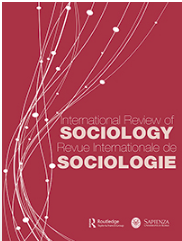"AbstractThis paper analyzes the evolution of public policies on nuclear energy from an international perspective highlighting an interesting sociological paradox: the opposition to the nuclear power contributed to the development of the environmental movement; and at present, the promoters of this kind of energy are including environmental arguments in their discourses: the fear of climate change and the reduction of CO2. Despite Kyoto Protocol does not accept this kind of energy as Clean Development Mechanism (CDM), its promotion is carried out on the basis of environment objectives, so that the nuclear lobby is obtaining more social acceptation thanks to the environmental discourse in the last four decades. For the carrying out this research, the nuclear policies from an international level are analyzed inside a wider research about the Nuclear Debate financed by Encuentro Foundation (Spain).
ResumenEl artículo analiza la evolución de las políticas, a nivel planetario, sobre la energía nuclear, a partir de una interesante paradoja sociológica: siendo uno de los componentes de la Sociedad Industrial madura que más ha contribuido al crecimiento del ecologismo y el ambientalismo, por oposición, hoy las corporaciones que la promueven vienen incorporando como base argumental fundamental los propios logros del movimiento ambientalista: el miedo al cambio climático y el objetivo de reducción del CO2. Aunque el protocolo de Kyoto no acepta esa energía como Clean Development Mechanism (CDM), paradójicamente se asiste su promoción a nivel planetario en base a los principios de sostenibilidad. Lo que se define como lobby nuclear consigue pues, paradójicamente, más aceptación que nunca en las últimos cuatro décadas, gracias al discurso ambientalista. Para la realización del estudio se analizaron las políticas nucleares a nivel planetario, dentro de una investigación más amplia sobre el Debate Nuclear financiada por la Fundación Encuentro (España).
"But attention must also be paid to certain intrinsic components of the anti-nuclear movement which - in terms of synergy – explain its success:
a) The movement represented the beginning of the end for bureaucratic political parties as the only channel available for the democratic expression of the interests of citizens.b) It brought certain decisions which involved risks to the public to be disputed not only in the technical but also in the political sphere.c) The arguments presented against nuclear energy were emphatic:● the risk or massive or localized radioactive contamination due to accidents, sabotage, terrorism or natural disaster,● the risk of low dose radiation,● possible geopolitical destabilization arising from nuclear proliferation, as a result of its use of the raw material for nuclear weapons,● the difficulties and costs associated with the management of nuclear waste,● dependence on other countries for access to technology, fuel6 (as in the case of fossil fuels) and for the management of waste,● deepening of center-periphery inequalities with plants normally being built in deprived areas with few inhabitants and a lower capacity for resistance, so making them lose all attractiveness for more normal development,● difficulties in counting the real cost of nuclear energy due to the failure to include public investment in research, the real costs of dismantling plants, the future costs of dealing with waste and risk management,● nuclear energy being seen by its very nature as a paradigmatic form of centralization and social control.But the ideology behind the anti-nuclear movement went far beyond that of opposition. Like all other ideologies it seeks to make sense of the world and is thus prescriptive, that is to say, it includes alternative proposals. Thus the anti-nuclear movement emerged as a specific social movement which developed a model of resistance to the dominant energy model and offers responses from a technical and economic viewpoint. Anti-nuclear scientists and technicians develop renewable energy solutions and criteria for efficient energy use that already form part of our daily lives.The reaction: the nuclear lobbyThe anti-nuclear has as its objective that humanity rid the world of nuclear energy in its entirety and not only its use for military purposes. It has had to confront two clearly defined social actors, the so-called military-industrial nuclear complex and the state, the latter heavily influenced, or even controlled, by the former which consists of military departments, research centers linked to universities, large electricity companies, capital goods manufacturers, consulting firms, politicians, opinion leaders, etc"
REFERENCIA:
Artemio Baigorri , Manuela Caballero & Mar Chaves (2012), "States and the nuclear power. An international perspective", International Review of Sociology/ Revue Intertaionale de Sociologie, Volume 22, 2012 - Issue 3, Page 446-470
https://doi.org/10.1080/03906701.2012.730823
Si no funciona el enlace, aquí hay un
Enlace a una versión del texto

